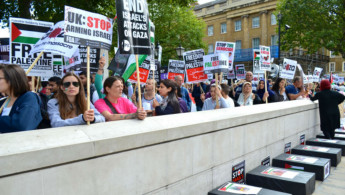UK university students, staff being excessively scrutinised for 'antisemitism' under IHRA definition
A new report by a pro-Palestine advocacy group and a Middle East-focused association has highlighted excessive scrutiny being exerted on British university students and staff members over claims of antisemitism.
The report by the European Legal Support Center (ELSC) and the British Society for Middle Eastern Studies (BRISMES) looks at struggles faced by students and professors accused of antisemitism according to a controversial definition laid down by the International Holocaust Remembrance Alliance (IHRA), when discussing issues on Israel and Palestine.
Dozens of civil society groups have warned that the IHRA definition is a threat to free speech, opening the way for criticism of Israeli government policy to be defined as "antisemitism".
The report documents 40 cases in 14 British universities involving antisemitism allegations, highlighting how the IHRA definition has been used against students and staff. In all cases, the accusations were not upheld.
The IHRA definition is essentially "undermining academic freedom" and "freedom of expression" when it comes to discussing Israel and Palestine, the report says.
What you need to know about the British government's anti-boycott bill: https://t.co/OWRB8ysgLd
— The New Arab (@The_NewArab) July 7, 2023
It goes onto state that events at universities were cancelled, and both students and staff members faced "lengthy" disciplinary proceedings while suffering stress and anxiety due to the "unjust and harmful consequences," that they could face.
They feared that their reputation would be harmed despite the accusations of antisemitism against them being officially dismissed.
"Students may face many obstacles while organising for Palestinian rights on campus, but they can also go through disciplinary proceedings because they posted about Israeli apartheid. Some also had to face harsh smear campaigns in the media," Alice Garcia from ELSC told The New Arab.
"This has very traumatic effects on students, at a time of their life when they are aspiring to careers and jobs! You can also imagine how hard it must be for Palestinian students to be silenced while they are just trying to depict their reality, or for students who are active in antiracist movements to be unfairly accused of antisemitism," she added.
Garcia also said that students were threatened with legal action when they wanted to organise events in favour of Palestinians, but these threats never materialised.
"We have not seen any legal measures taken against students or anyone else for defying the definition itself, probably because this would not stand in a court. Indeed, this would be a serious restriction on freedom of expression," she said.
"We believe that these threats only serve to create a chilling effect and prevent activists, including students, from speaking out about Israeli crimes and Palestinian demands for liberation," Garcia added.
Two professors from the British Society for Middle Eastern Studies highlighted the importance of the report and the problems with the IHRA definition of antisemitism.
"This impressive report demonstrates convincingly that instead of opposing antisemitism, the IHRA definition has worked systematically to suppress freedom of expression on campus, undermining one of the central pillars of university education," Prof. John Chalcraft from the London School of Economics said.
Prof. Miriyam Aouragh from the University of Westminster says the IHRA has worked years to single out Palestinian, Arab and even Muslim educators "for suspicion and even abuse," rather than combatting actual antisemitism.
More than 100 civil society organisations warned the United Nations in April against adopting the IHRA definition of antisemitism, and the White House in May refused to endorse the controversial definition.
The developments at UK universities comes at a time when the British parliament is discussing a bill to outlaw the pro-Palestine Boycott, Divestment and Sanctions (BDS) movement, which aims to hold Israel accountable for its crimes against Palestinians and continued occupation of Palestinian land.
The UK government has been promising for years - under pressure from Israeli ministers and supporters of Israel within the ruling Conservative party - that it would restrict BDS activities.





 Follow the Middle East's top stories in English at The New Arab on Google News
Follow the Middle East's top stories in English at The New Arab on Google News


